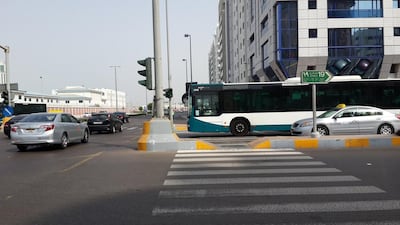I am a resident of Abu Dhabi and have been campaigning for pedestrian safety. Recently I read an article in your newspaper saying that motorists have been warned that they run the risk of a Dh500 fine if they stop their vehicles in the middle of a pedestrian crossing (Abu Dhabi motorists warned against stopping on pedestrian crossing, June 22).
But yesterday I saw a bus stopping in the middle of a pedestrian crossing and obstructing the pedestrians, including myself. The picture above might draw the attention of the authorities.
Iftekhar Ahmed, Abu Dhabi
Ensure safety of train passengers
It is sad to hear about frequent train accidents in India (Two trains derail in India killing four, June 29). The government conducts inquiries whenever an accident occurs, but they have not helped to make the situation better.
The real cause of the latest tragedy is not yet known, although Maoists have been suspected. But what about the other accidents that happened in the past few months? The authorities should stop blaming militants for every incident and immediately take measures to ensure safety of passengers.
K Ragavan, US
EU must avoid interference
The killing of four innocent Palestinian civilians by a heavily armed, state militia searching for three missing Israeli youths from families that left the United States to illegally settle in the West Bank and Jerusalem is allegedly a war crime (as is also the abduction of civilians) under the Geneva Conventions, to which both the EU and US are signatories.
However, more relevant is the fact that the Israeli lobby is so powerful in the US. The question is, can’t it exert the same power over the EU parliament?
However, if the EU insists on remaining truly democratic and rejects the undue influence of foreign lobbyists, then freedom and the rule of law may prevail. Let us fervently retain that hope.
Anthony Bellchambers, UK
Highway code is necessary
I refer to the article Safety expert advocates UAE federal highway code (June 30). The code is particularly necessary to keep heavy vehicles under control. They should never be given the extra 10 or 20kph speed allowance.
The moment you give that opportunity to these drivers, they tend to break the rules. In other words, if the maximum speed limit is 100kph for heavy vehicles, they should stay below it.
Many times, I have been in situations where buses and lorries came flashing their headlights from behind. The RTA buses are no exception. They should also be made to stay within the last two lanes, so as to keep the rest of the lanes free for lighter vehicles.
There is a rule that public and commercial vehicles should display specific phone numbers on which complaints can be made in case of dangerous driving. But proper monitoring is needed to make this system effective. A dedicated centralised contact number will be more helpful. I am sure consistent efforts will help make our roads safer and better. Let us all work together towards this objective.
Ramesh Menon, Abu Dhabi
Emiratis have work ethics
There are some Emiratis who are lazy, but there are quite a few of us who are highly educated and have a great work ethic (Emiratisation is happening on 'paper only', June 26). The fact is, the UAE is obliged to educate and hire Emiratis.
If I go to work in another country, the same rule would apply: provide jobs to the citizens first and if they can’t find a citizen to do the job, then hire a non-national.
Also, work ethic can’t be imposed. You either have it or you don’t, and you learn this from a young age.
Elham Al Marzouqi McMillan, Abu Dhabi
UAE can highlight the role of Arabic
I read Peter Hellyer's opinion article All of us in the UAE will benefit from better standards of Arabic teaching (June 25) and could not agree more. In fact, I have been taking Arabic lessons hopefully to be part of the solution.
I feel that the UAE is working hard to show the world it is possible to be productive and efficient in the Arab world and, as a linguist, the UAE is perfectly placed to show the world the potential importance of Arabic as a language of trade and culture.
I am a British trained Russian (and French) teacher, so I have a good understanding of how to teach non-Latin alphabet based languages. My aim is to be able to combine my skills as a linguist and teacher to play a role in reforming the way Arabic is taught to foreigners.
Richar Barker, Dubai

